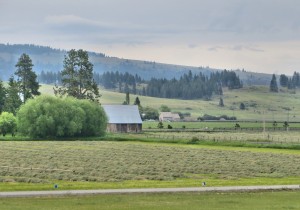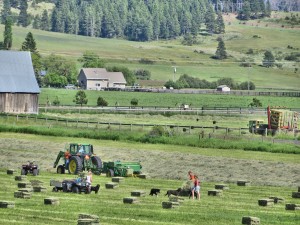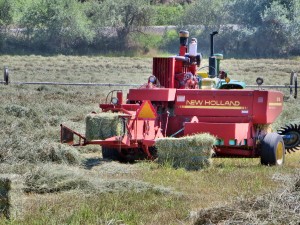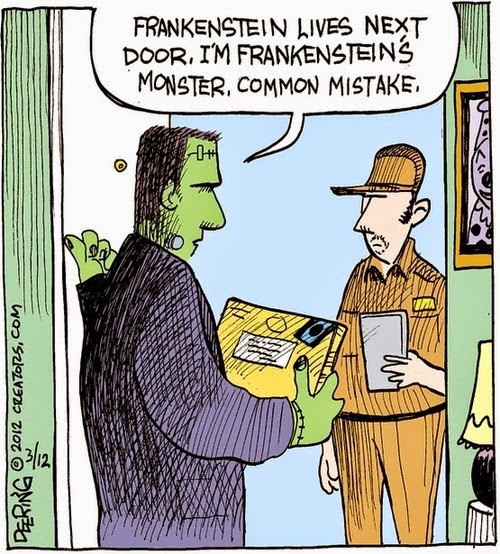Making Hay
By Cathy Perkins
[Cathy is traveling with internet problems, so we’re featuring a past post of hers today.]
It’s hay making season in our mountain valley. The process is interesting, even if it does play havoc with my husband’s allergies. One of the things that surprised me, though, was the parallels I saw between making hay and writing.
Stay with me.
Let’s look at the hay process first. There are three basic requirements for growing hay: land, water and sun. Lots of each one. Once the grass reaches the right stage—tall, but not gone to seed—the ranchers start watching the weather even closer than they usually do. Hoping the forecast holds, they cut the grass in wide swathes and let it dry.
Over the next few days, the ranchers fluff—okay, the technical term is swath—the hay so it dries evenly. Once the hay is dry, they can bail it into bricks that litter the field at regular intervals.
This year’s first cutting looked terrific and the initial bids from Japan were $300/ton. The earliest cutters started bailing and there was happiness in the valley.
Then the unexpected happened. A storm boiled over the Cascades and drenched the valley. All the grass still on the ground went from being prime hay to cattle feed—not even dairy cow feed—at a price that will barely cover the expense of bailing it.
As soon as the sun reappeared and dried things out, the ranchers fluffed what was there and prepared to get it out of the field and make way for the next crop.
There are other ways things can go wrong. Balers break and things get stuck. Weeds invade from untended land. But the men and women who ranch for a living keep going, raising hay for their horses and other people’s cows.
So how is any of that like writing?
Well, you start with three basic ingredients to create a story: writer, imagination and paper—lots of each one. The author nurtures the story to The End and fluffs and cuts and edits, hoping for that premium bid for the manuscript. But things outside the author’s control can ruin that venture. A decision somewhere else that Steampunk/Chick Lit/Romantic Suspense/Whatever is “dead” means that particular manuscript isn’t going anywhere except a closest or thumb drive. (Hmm… considering indie-pubbing yet?)
Like a bale in the baler, words can get stuck. It’s much harder to find a repair person for a broken or missing muse than a clogged machine.
Like the rancher, the writer keeps putting words on the page, creating stories, because that’s what writers do.
Can you think of any other parallels?
award-winning author of financial mysteries, Cathy Perkins writes twisting dark
suspense and light amateur sleuth stories. When not writing, she battles
with the beavers over the pond height or heads out on another travel adventure.
She lives in Washington with her husband, children, several dogs and the
resident deer herd.
To celebrate, So About the Money, book 1 in the series is currently on sale for 99 cents!






